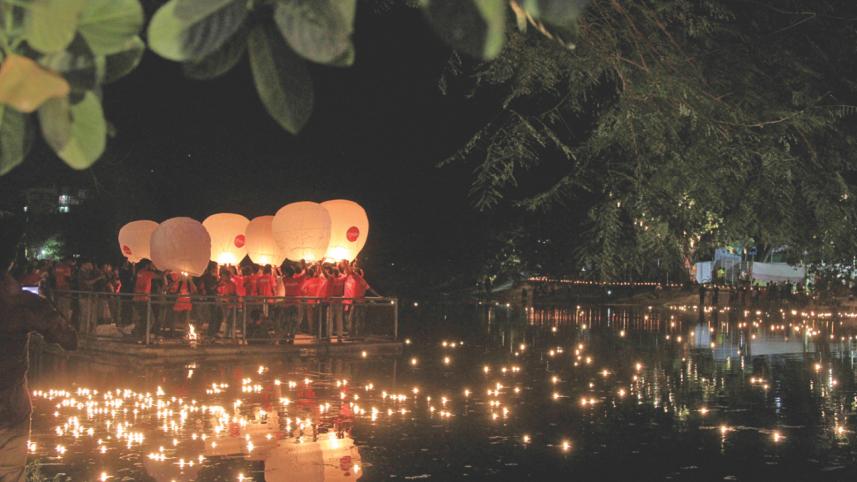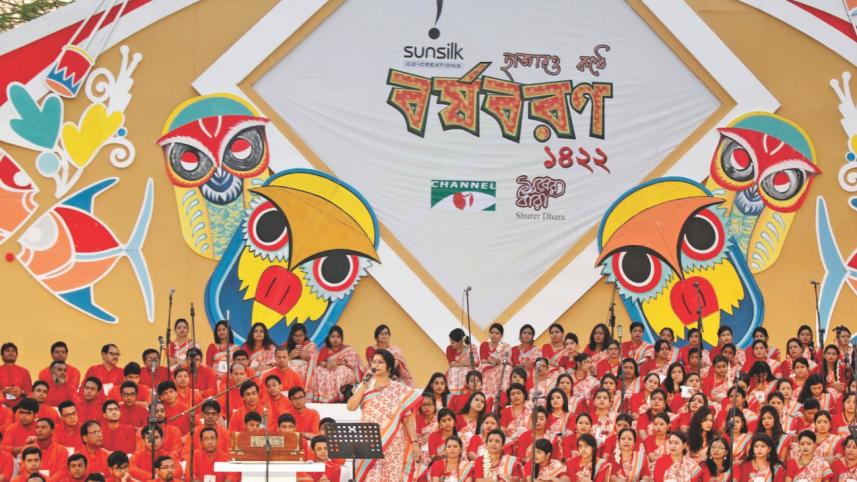Awaiting the dawn …

Pahela Baishakh, since the nineties, has had a boom – in terms of participation, grandeur, outreach and possibly 'urbanisation' of the festival. The growth of Pahela Baishakh celebrations has reached to the night before as well. While Chaitra Sankranti is yet to become a mainstream celebration in the cities, the spill-over of urbanites' anticipation to the buildup of the festivities are being accommodated more and more.
Surer Dhara has been bidding farewell to the Bangla calendar year for a decade and a half now, and this year was no different. In association with Channel i and powered by Sunsilk, this year's event, 'Borsho-biday' and 'Borshoboron' – held at the Bangabandhu International Conference Centre (BICC) – paid tribute to the Poncho-Kobi (Tagore, Nazrul, Atulprasad, Rajanikanta and DL Roy). Beginning after sundown on April 13, the first half of the programme was held till midnight, and the second half on the dawn of April 14. Senior and promising artistes alike took stage one after another to sing solos mirroring our culture, language, heritage and struggles, while songs and dance performances by children, of songs like “Amra Shobai Raja” and “Ora Okarone Chonchol” captivated the audience till midnight. Pahela Baishakh's celebrations at BICC were highlighted by the chorus of “Esho Hey Baishakh”, led by Surer Dhara's founder and principal Rezwana Chowdhury Bannya, and had a bustling Baishakhi fair at the premises till noon.
Elsewhere, Blues Communications organised “Alokito Baishakh” sponsored by Coca-cola at the Rabindra Sarobar, lighting up the Dhanmondi skies with hundreds of fanush, the lake with thousands of floating candles and the trees with pretty light-shades made of paper. The concert line-up was also impressive: while Aditi Mohsin performed an essential Tagore set – from patriotic to romantic to festive, Shafi Mondal and his troupe took a philosophical journey on the path of Lalon and other folk numbers, James had a crowd of a good few thousands go berserk with his “Pagla Hawa”, “Sultana Bibiyana” et al. past midnight, Nemesis' infectious energy transferred to the crowd, and Bappa Mazumder wrapped up the show with his melodic hits like “Baji” and “Pori”. However, poor time management from the organisers meant the event – which was promised to go on till the morning – ended at 2:30am, stranding many attendees under the open sky with nothing to do but wait till dawn to go home. A few food stalls set up on the other side of the lake, became their refuge.

Charukola also stayed awake and alive through the night, with last-minute brushwork being put on the Mongol Shobhajatra masks and structures, and students and general public alike merrymaking all over the faculty premises, singing songs and enjoying themselves.
What stood out in all of the celebrations is that Dhaka'ites just need a reason to celebrate and the opportunity. That day is not far when staying up all night before Pahela Baishakh with music, lanterns and just roaming around the city in last-minute anticipation of ushering in a New Year – will become a common practice.



 For all latest news, follow The Daily Star's Google News channel.
For all latest news, follow The Daily Star's Google News channel.
Comments